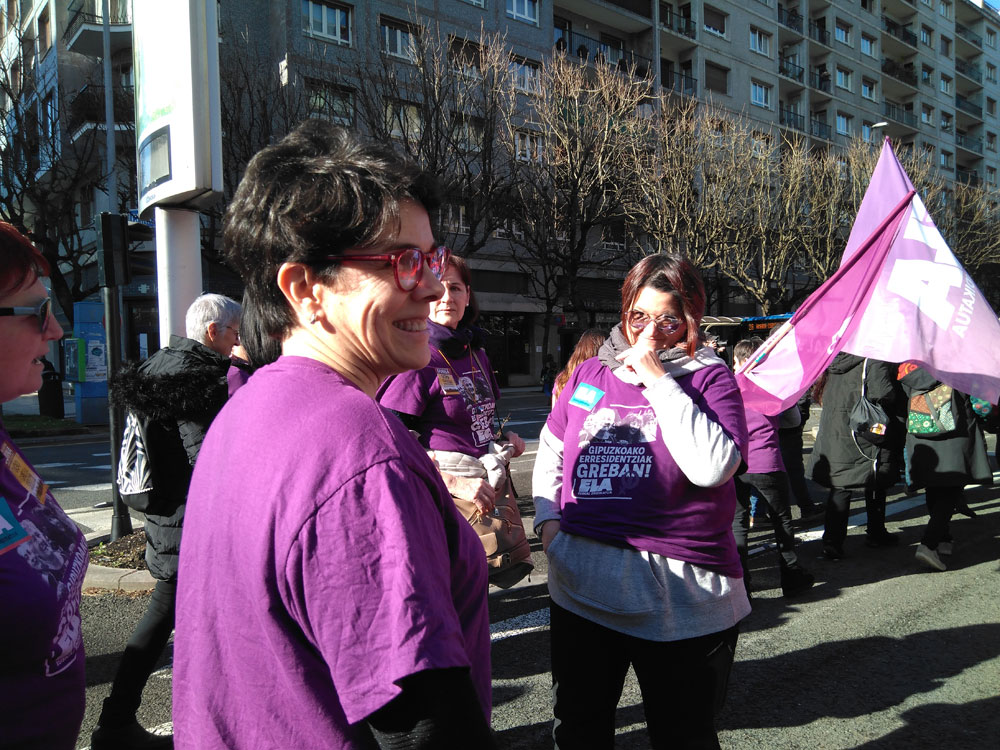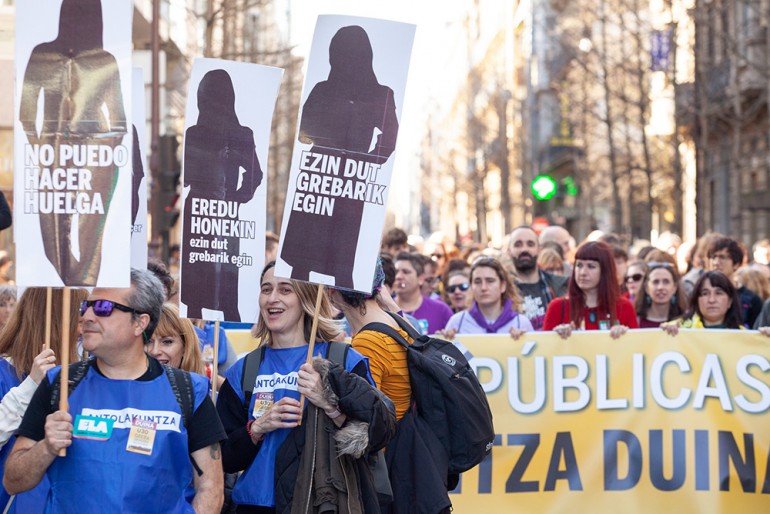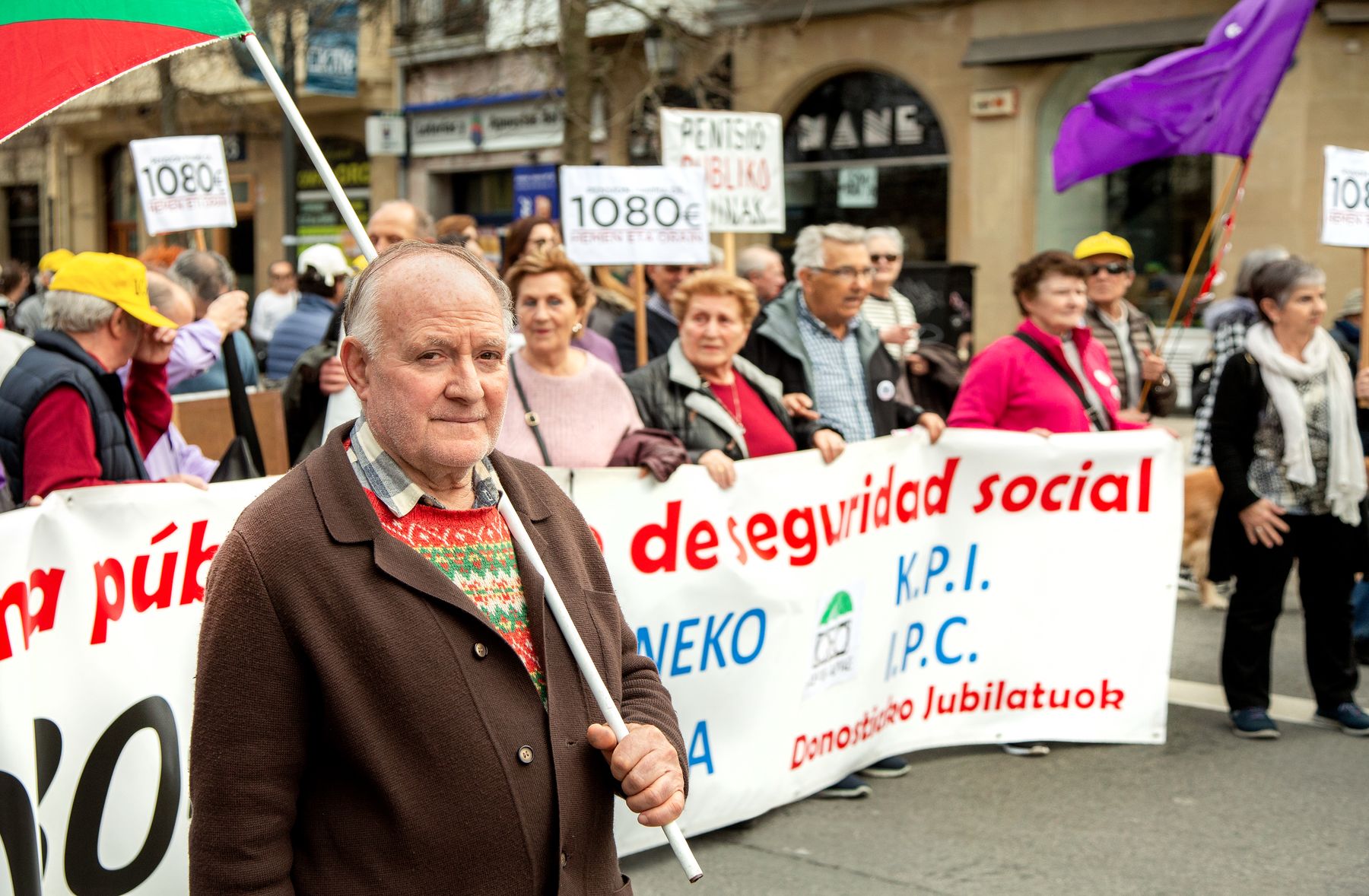"For us it's Strike Day 199"
- We spent the morning with Aitziber Aranberri and Ana Mertxan. Both are workers in the nursing homes of Gipuzkoa. Today is a special day, because thousands of citizens have taken to the streets to claim a pension, a job and a dignified life. Residential workers, for their part, have supported today’s strike in the sector, which has lasted 199 days. They've come very trained to meet today.

At 9:30 we stayed with Aranberri and Mertxan on Avenida de la Libertad de Donostia. They wear jackets, but the famous purple t-shirt, the great sample of the strike that lasts so many days, is evident. Even if it doesn't get cold, the atmosphere will get warm, and putting the jackets aside, the t-shirts will be visible throughout the morning.
The journalist has asked them about today's strike and they have had a hard time telling them the figure. A dozen people in the sector have come together and we all do not know how many days of strike have been carried out, the days are no longer counted. In the end, the number awarded has been 199, according to the same source.
Our protagonists are the most complicated of the struggle. Aitziber Aranberri, a native of Usurbil, began working thirteen years ago at the Villa Sacramento residence in Donostia-San Sebastián, where he currently resides. He has been a trade union delegate to ELA for about four years. Beasaindarra Ana Mertxan has worked for twenty years in the residence San José de Ordizia and is released in the last three years. It coordinates the home care, residences and day centers of the region of Oria-Goierri.
.jpg)
The piquet of the avenue has been set in motion and in the group of workers in the residences someone said: “Let’s go to the humblest, right? Accustomed to the protests in the residences, it has no salt! We are noisier!” The residence is a work of care and in their skin they experience contempt for the tasks of care and contempt for the caregivers. That is why, since they started the strike in September 2018, they have tried, time and again, to step down the street. This is what Aranberri says: “What we haven’t done! The march, the camps, we were at the Festival, we have distributed thousands of leaflets… We have done a lot, and yet some citizens tell us that we should not change the fighting style so that society and the authorities listen to us more. Anyway, don't think that this strike that we're doing now I have it first, for me it's the third strike. The day I started working, they were on strike at the residence. I started working, and I realized right away that without struggle we won’t get better.” They are faced with the employers and the Council and the frozen sectoral agreement.
With Aranberri we're thrilled to chat, but all of a sudden he tells us he's going at 12:30. A strange moment to leave, as it is at that time when the manifestation begins. The usurbildarra is going to work: “In the busiest hours of the day we have minimum services of 90% and in the calmest hours, of 80%. At night we're working 100 percent. The workshop workers all go to the street together and the machines stop. In our case, almost nobody can go out into the street. We cannot come together to make a demonstration. I have already told him that I am now going to work and I will leave at 18:30. Let’s see if I catch the Hernani afternoon demonstration.”

We've gone to Aranberri and we've stayed with Mertxan. We have met with the column of the Amara neighbourhood and joined several strikers in the residences. One of them complains: "What kind of manifestation is this? Won't we pull out our banner?" Mertxan clarifies that he is the most marshal striker and that although it is not the day of the banners of concrete demands, he will soon begin to set the scene. That has been the case. The purple t-shirts have come together and have started shouting slogans: “The struggle is the only way!”, “Gora borroka feminista!”, “Gora gora gora gora emakume borroka!”, “Markel Olano gezurturte!”, “Maite Peña gezurtara!”. They have long stressed that their work and feminist struggle is their own. 95% of the workers in the sector are women and are still performing care and care tasks, which are very undervalued. He who brings the public address to the boulevard has not kept quiet and his colleagues have helped him to make crowns. They have been training for many months, and today is another day.
Mertxan was sad and angry early in the morning, as the employers and the Provincial Council of Gipuzkoa have carried out a 200-day strike and treated them as if they were no one. They have felt marginalized and despised.
We asked the Boulevard what body it has now. He reflected for two seconds and said with a smile: “I told you in the morning that I was sad and angry, now I’m happy.” They've recovered.
U30 will pass at full speed. The strikers in the elderly ' s homes in Gipuzkoa will continue to do so. Conclusion U30 will be 200.

Hego Euskal Herrian arrazoi soziolaboralak edo politikoak direla medio, greba orokor bat deitzeak bere jarduera guztia geldiaraztea bilatzen du. Batzuentzat urtarrilaren 30eko greba orokorra arrakastatsua izan da, eta beste batzuentzat porrota, bakoitzaren betaurrekoen arabera.
Urtarrilaren 30eko Greba Orokorraren biharamunean, grebak suposatu duenaren inguruan hausnartzeko tartea hartu dugu Sonia Gonzalezekin.





















